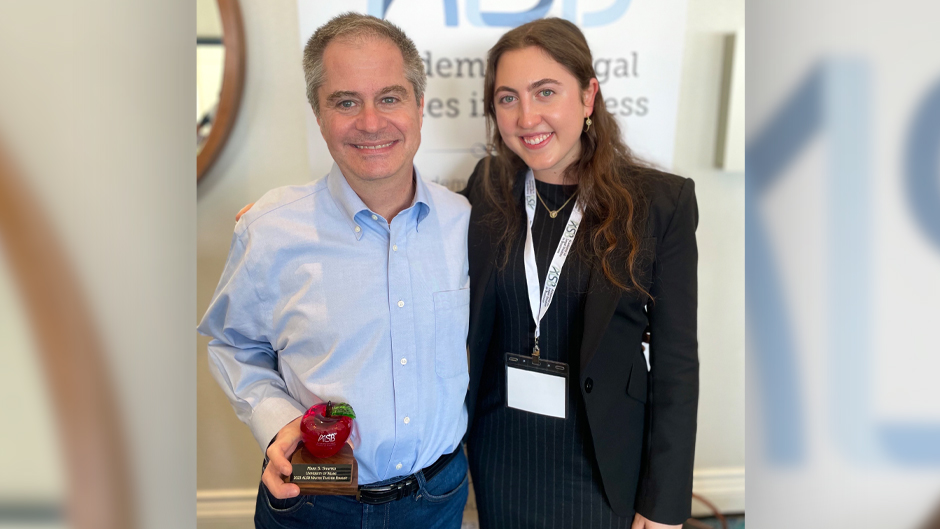Hannah Kuker knew something had to be done about the growing number of artists on her Instagram feed speaking out against the potential dangers of art created by artificial intelligence because they felt like it was impeding on the industry.
“Many of them felt like it was copyright infringement,” said Kuker, a junior pursuing finance, legal studies, and studio art majors at the University of Miami. “I was curious about the merits to that and if I could find a solution to it.”
That passion led Kuker to win Best Student Paper/Presentation at the 99th annual Academy of Legal Studies in Business (ALSB), an international association of teachers and scholars in the fields of business law, legal environment, and law-related courses.
Kuker, from Hollywood, Florida, was one of five students from around the country selected to present their papers in person during the annual conference that was hosted this year in San Diego, California.
Her paper, “Inspiration Versus Infringement: Why the Right to Use Copyrighted Images for Referential Purposes by AI Should Not Be Held to Higher or Different Standards Currently in Effect,” discusses AI rights to copyrighted material with a specific focus on the visual arts, including the recommendation of new legislation on the matter.
“That means we should be holding AI to virtually the same standards as human artists,” said Kuker, who is an artist herself. “I feel so lucky to have found a branch of law in which I can combine my love for art and the law. This paper has been such a passion project for that reason.”
When the paper was only an idea, she shared her preliminary thoughts with someone she considers a mentor—Patricia Abril, professor and chair of Business Law at the University of Miami Patti and Allan Herbert Business School and interim dean of the Graduate School. From there, Abril connected her with Stuart Pardau, associate professor of practice in the Miami Herbert Business School, and Joseph Avery, an assistant professor in the Miami Herbert Business School and the Department of Psychology in the College of Arts and Sciences. Avery’s research interests are at the intersection of business, law, and technology. He also wrote his own AI software.
“Hannah worked with the three of us on this innovative idea that is very well suited to her,” said Abril. “She merged her identity as an artist with her interest in legal scholarship and the result was an accessible and adept description of an emerging legal issue and an innovative solution. That is pretty extraordinary for an undergraduate student.”
Kuker said she wouldn’t have achieved what she did without the help of Abril, who introduced her to intellectual property law and always pushed her to think bigger, as well as her faculty sponsors Avery and Pardau, who provided invaluable insight and guidance.
“Hannah took on a pressing and complex challenge with this project. Navigating the rapid advancements in AI and the vast landscape of legal doctrines is no small feat. Her proactive approach in crafting a potential blueprint for future discussions in this dynamic field is commendable,” noted Avery, applauding Kuker's readiness to roll up her sleeves and face the daunting task head-on.
“I’m still in shock,” Kuker said. “There were many nights of staying up until 2 a.m. and waking up at 7 a.m. that this is such a fever dream of hard work.”
The research that Kuker presented at the ALSB carefully laid out multiple suits, notably Getty Images (US) Inc v. Stability AI Inc, which alleges that infringement occurs at the training stage, as algorithmic models learn from copyrighted works. In the article, she argues that siding with claimants would set a dangerous precedent of data restriction, potentially requiring AI companies to obtain permission to use copyrighted works in their database in a manner that contradicts existing rights to taking inspiration protected by copyright law.
She instead puts forward recommendations to give AI-art generators the right to use copyrighted images for referential purposes unless the outputs meet the substantial similarity test. Furthermore, she attempts to balance protecting artist’s livelihoods and preserving the original intentions of copyright law with the proposal of an original legal test—the economic nexus test—to be used in vague cases of transformativeness where financial implications are stark.
“We’re very proud of her,” said Abril. “She just knocked the socks off of everyone in the room.”
Kuker also considers Mark Shapiro, associate dean for undergraduate career advancement and professor of professional practice in business law, as a another mentor and “frankly, all around life coach,” she said.
“Hannah has always been extremely focused, disciplined, and enthusiastic about the law,” said Shapiro. “She did a really nice job at demonstrating the need for updates in the law to reflect updates in technology. The reality is that law can be very slow to react when technology moves. She made it super accessible and had very good ideas for how the law should approach this problem and brought a solution. Her presentation was clear and persuasive, and she received a lot of tough questions from the audience, but she handled them like a pro.”
Shapiro also attended the conference and was chosen as this year’s Charles M. Hewitt Master Teacher award, an incredible national honor for business law professors, which he received for his work on his original course, The Law of Risk. Avery was named Best New Reviewer.
“It was a proud day to be a part of the University of Miami Herbert Business School,” said Kuker.

